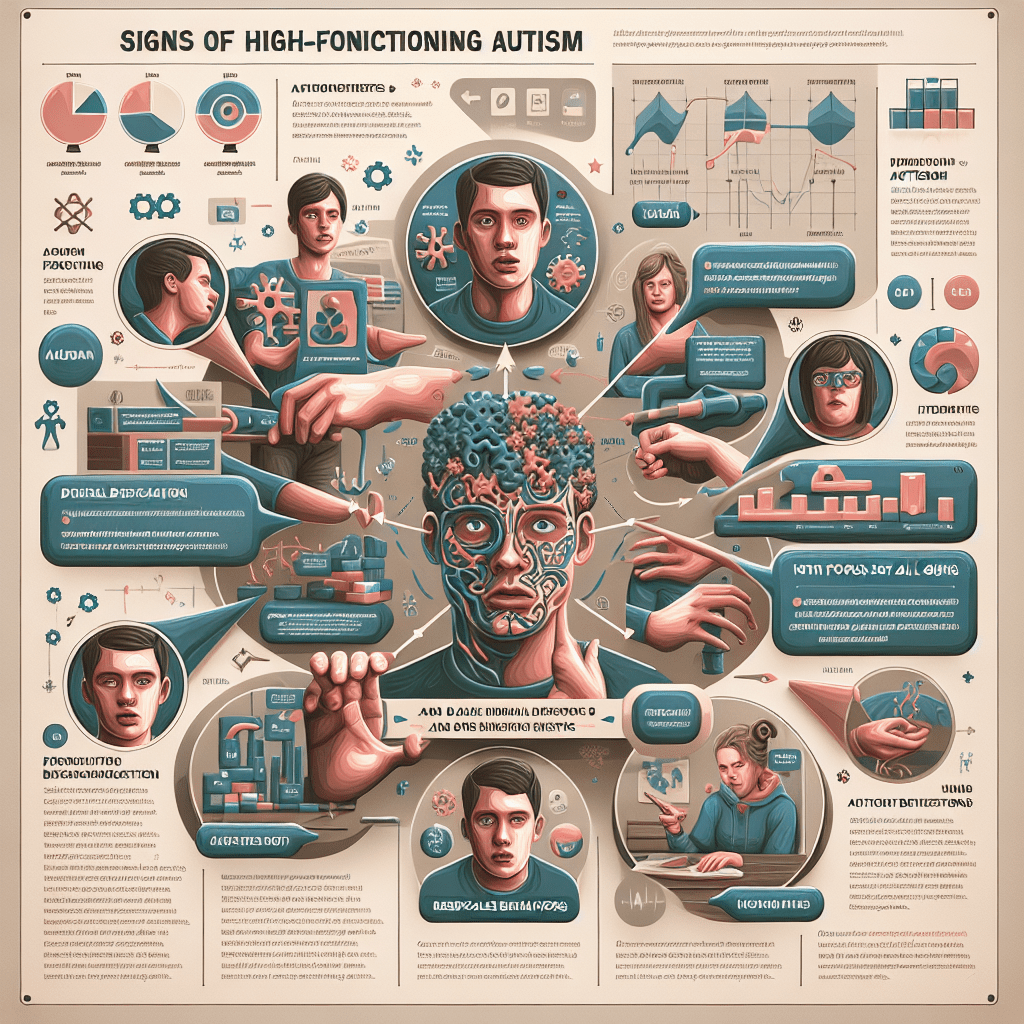How to Tell if Someone is High-Functioning Autistic?
Are you trying to understand the subtle signs of high-functioning autism in someone you care about? You’re not alone. Many people wonder how to tell if someone is high-functioning autistic, especially given that these individuals can often blend into society while still facing unique challenges. In this article, we will break down high-functioning autism, its characteristics, and the ways you can recognize it.
High-functioning autism (HFA) refers to individuals on the autism spectrum who typically display average to above-average intelligence. While they may excel in certain areas, their cognitive differences can lead to challenges in social interactions and emotional understanding. Recognizing these traits is crucial for fostering understanding and support.
Understanding how to tell if someone is high-functioning autistic requires knowledge of the distinct characteristics and behaviors that may signal this condition. It’s important to remember that each individual is unique; what is true for one person may not apply to another. However, by observing specific signs and engaging in compassionate dialogue, you can gain valuable insights.
Understanding the Nuances of High-Functioning Autism
To effectively address the question of how to tell if someone is high-functioning autistic?, we must delve into some of the common characteristics associated with high-functioning autism. These individuals may exhibit various traits that can often be misinterpreted or overlooked.
One of the first signs to notice pertains to communication styles. Individuals with HFA may struggle with the nuances of social communication, which can include difficulty maintaining eye contact, interpreting social cues, or understanding figurative language. While they can have a rich vocabulary and articulate their thoughts well, they may take statements very literally and miss out on jokes or sarcasm. This disconnection can lead to misunderstandings in social settings.
Another important factor is the tendency towards repetitive behaviors or strict routines. Many high-functioning autistic individuals thrive under a structured environment and can become distressed with unexpected changes. This might manifest in a need for predictability, such as following the same route to work or having a rigid daily schedule. Such behaviors aren’t merely idiosyncratic; for many, they help manage anxiety and maintain a sense of control.
Sensory sensitivities are also a significant aspect of high-functioning autism. These individuals may possess heightened or reduced sensitivity to sensory inputs, such as light, sound, touch, taste, or smell. For example, a loud restaurant may feel overwhelming, while certain textures of clothing may be distressing. Observing how someone responds to their environments can be a critical factor in determining whether they are high-functioning autistic.
Moreover, many individuals with HFA have intense interests or specializations. This hyper-focused passion can lead to amazing expertise in specific fields. However, it may also detract from abilities in social communication or create an impression of social awkwardness during interactions that veer away from their areas of interest. Understanding this degree of specialization is essential when considering how to tell if someone is high-functioning autistic.
In examining these characteristics, it’s essential to approach the topic with care, empathy, and respect. Having conversations with the individual and maintaining a supportive environment can help foster understanding. At times, simply asking questions or offering support can make a world of difference.
Recognizing Social Interaction Patterns
When considering how to tell if someone is high-functioning autistic, social interaction patterns provide vital clues. Observe how the individual engages with others, as there may be distinct signs that indicate their level of comfort and social awareness.
People with high-functioning autism often have difficulties in initiating or sustaining conversations. They may prefer to talk about themselves and their interests rather than engage in reciprocal dialogues. This one-sided communication can sometimes give the impression of being aloof or self-centered. Consider whether the individual shows difficulty when it comes to sharing experiences or asking questions; these tendencies can often go unnoticed in casual conversations.
Additionally, understanding emotional responses is crucial. Individuals with HFA may struggle with recognizing or expressing their own emotions or the emotions of others. They could find it challenging to empathize or respond appropriately in emotionally charged situations. This may manifest as an inability to offer comfort to a friend in distress or a lack of understanding when someone feels rejected. Recognizing these emotional cues can be essential in determining whether an individual is high-functioning autistic.
Another aspect to assess is the use of non-verbal communication. Individuals with high-functioning autism often display unusual body language, facial expressions, or gestures. They might not naturally utilize typical social signals like smiles or nods. Misreading such non-verbal cues can contribute to misunderstandings and hamper relationship-building, further reinforcing social isolation. When observing someone, notice their body language and the extent to which they utilize these non-verbal communication techniques.
High-functioning autistic individuals may also exhibit a penchant for literal thinking. They often take things at face value and can struggle with abstract concepts or metaphors. This can lead to social gaffes and confusion in conversations. Assessing how the individual interprets questions or comments can provide insight into their thinking processes.
Encouraging Understanding and Building Connections
Now that we’ve discussed the core characteristics and signs, let’s focus on creating understanding around the question of how to tell if someone is high-functioning autistic. Building connections with individuals with HFA can be achieved through empathy, patience, and education.
One of the most effective methods for approaching individuals suspected of being high-functioning autistic is fostering an open communication environment. If you’re close to the individual, consider having direct conversations about their experiences and perspectives. Encourage them to express their feelings and thoughts openly, making sure they feel safe while doing so.
Another strategy is to offer understanding and support in social settings. High-functioning autistic individuals often feel overwhelmed in crowded places or loud gatherings. If someone appears anxious or uncomfortable, it may be beneficial to provide a sense of security by suggesting quieter environments or taking breaks when needed.
Additionally, educate yourself about autism spectrum disorders. Familiarize yourself with the terminology, challenges, and strengths associated with high-functioning autism. This not only builds awareness but aids in dismantling misconceptions. Consider sharing resources with the person if they’re comfortable—for example, books or websites on autism that challenge stereotypes and highlight varying experiences.
Lastly, advocate for inclusion and understanding in wider social circles. Promote acceptance and encourage others to learn about autism. Combating stigma and fostering community support can create a healthier environment for everyone involved. When you learn how to tell if someone is high-functioning autistic, not only do you position yourself to provide better support, but you also encourage a greater understanding of diversity and human experience.
Conclusion
In summary, understanding how to tell if someone is high-functioning autistic encompasses recognizing a range of traits and behaviors. From communication styles to social interaction patterns, each sign gives insights into the individual’s experiences and challenges. It’s essential to practice empathy, promote awareness, and foster connection to ensure that high-functioning autistic individuals feel understood and valued.
Ultimately, navigating these nuances can be challenging but rewarding. By actively participating in open dialogues, educating yourself and others, and advocating for inclusion, you can contribute to a more inclusive society that recognizes and celebrates neurodiversity. So, the next time you wonder how to tell if someone is high-functioning autistic, remember that it’s a journey marked by understanding and compassion.
Frequently Asked Questions (FAQs)
1. What are the key signs of high-functioning autism?
The key signs of high-functioning autism include challenges in social communication, repetitive behaviors, sensory sensitivities, and intense interests in specific subjects.
2. Can high-functioning autism be diagnosed?
Yes, high-functioning autism can be diagnosed through a comprehensive evaluation by a healthcare professional who specializes in autism spectrum disorders.
3. How does high-functioning autism affect daily life?
High-functioning autism can impact daily life by making social situations challenging, requiring structured routines, and influencing emotional responses and sensory perceptions.
4. Are there treatments or therapies for high-functioning autism?
While there is no cure for autism, therapies like cognitive-behavioral therapy (CBT), speech therapy, and occupational therapy can help individuals develop coping strategies and social skills.
5. How can I support someone who is high-functioning autistic?
To support someone with high-functioning autism, foster open communication, educate yourself about their experiences, and advocate for their inclusion in social environments.





